新编大学英语第二版第三册第5单元课文翻译
- 格式:docx
- 大小:22.30 KB
- 文档页数:4
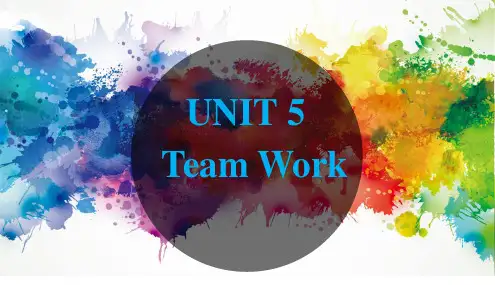

新编大学英语3原文篇一:新编大学英语3课后练习答案与课文完整版(包括预习课后阅读)103fBook 3课后练习参考答案:Unit 1Part onepreparation1.1)Gentle2)Dedicated3)Considerate4)Adventurous5)Calm6)Aggressive7)Critical8)Energetic9)Selfish10)Ambition11)Self-confident12)Easygoing13)Truthful14)Outgoing15)Frank16)Sensitive17)Bossy18)Patient19)Talkative20)Persuasive21)Sympathetic22)Emotional2.Jobs Personalitysalesperson undependable、shrewd、tricky、boastfulteacher knowledge、talkative、patient、energetic、unselfish、tolerantdoctor calm、skillful、sympathetic、careful、unselfishpolice office brave、calm、alert、carefulaccount cautious、careful、efficient、truthfullawyer knowledge、persuasive、talkative、expressive、intelligenttourist guide energetic、good-tempered、talkativehost or hostess of a show quick-minded、humorous、knowledge、expressive、emotional reporter adventurous、brave、curious、efficientsecretary considerate、careful、efficient、easygoingspokesperson diplomatic、intelligent、eloquentIII. Post-ReadingReading Comprehension1. Understanding the Organization of the Text1) Introduction: (Para.1)Shyness is the cause of much unhappiness for a great many people.2) Reasons why shyness can have a negative effect: (Para.2&3)People’s self-concept has a profound effect on all areas of their lives.People with high self-esteem usually act with confidence.People with low self-esteem are likely to be passive and easily influenced by others.3) Ways of overcoming shyness: (Para.4-15)i) Recognize your personal strengths and weaknesses.ii) Set reasonable goals.iii) Don’t waste time and energy on destructive feelings such as guilt and shame.iv) Don’t be afraid to speak up and give your point of view.v) Do not make negative comments about yourself.vi) Accept criticism thoughtfully.vii) Profit from failures and disappointments by viewing them as learning experiences.viii) Do not associate with people who make you feel inadequate.ix) Set aside time to relax, enjoy hobbies, and reevaluate your goals regularly.x) Practice being in social situations.4) Conclusion: (Para.16)The better we understand ourselves, the easier it becomes to live up to our full potential.2. Understanding Specific Information1) F2) F3) T4) T5) T6) F7) T8) F9) F10) T3. Group Discussion1) I think the most effective ways of overcoming shyness are the first and seventh ways. Recognizing our personal strengths and weaknesses is useful because if we know ourselves better, we can feel more self-confident. We can be more objective, instead of being blind. The seventh way is to profit from failures and disappointments as learning experiences. If we allow ourselves to get discouraged and sad when we fail, then we will feel more unsure of ourselves. But if we think of a failure as a learning experience, we are adopting a positive attitude. By analyzing objectively why we failed and planning how to set about doing things differently we will be more likely to succeed next time.2) Modesty is used to describe a reserved appraisal of one’s merits, abilities or success, e.g. she is very modest about her accomplishments. Shyness is used to describe the uncomfortable feeling one has in the company of others. It often implies a lack of self-confidence and a timid, reserved manner. Modesty is a good personality trait while shyness in many cases is undesirable.3) Yes, it is appropriate and normal to be shy in some circumstances: in the presence of teachers, your boss, your parents’ friends or your prospective in-laws; when you are dating someone, especially the first time; when you are with strangers; when you are in a new environment; when you’re facing a large audience.Vocabulary1. Self- is a prefix which means ―of, to or by oneself or itself.‖Words with the prefix self- that appear in the text: self-conscious, self-concept, self-assurance, self-worth, self-confidence, self-esteem, self-destructive, self-awareness, self-accept103fance, self-rejection, self-confident1) self-conscious (worried and embarrassed about what you look like or what other people think of you)2) self-confidence (belief in one’s own ability, power, judgment, etc.; confidence in oneself)3) self-esteem (the feeling that you are someone who deserves to be liked, respected, or4) self-destructive (with thoughts or actions that are counter to one’s own best interests)5) self-worth (the value you give to your life and achievements)6) self-concept (one’s conception or general idea of one’s own basic character and nature)7) self-awareness (realistic knowledge and judgment about oneself)8) self-assurance/self-confidence (the belief that you are able to deal with people and problems easily)2. Part A1) B2) I3) L 4) A5) H6) D7) E8) N9) J10) M11) C12) F13) G14) KPart B1) profound2) jealousy 3) numerous 4) overweight5) overcome6) eventually7) slim 8) compliments 9) diminish10) reassurance 11) detrimental12) isolated13) self-esteem14) accented3. 1) reflected 2) concerned/worried 3) profound effect 4) viewed/regarded 5) sensitive6) respond/react 7) eliminated 8) overcome my fear 9) concentrate on 10) made no commentTranslation1.You should spend a reasonable amount of time relaxing and exercising.2. In general children are healthier and better educated than ever before.3. When the right opportunity comes along, he’ll take it.4. Every day he sets some time aside to be with his family and enjoy life.5. I remember those dark streets and walking hand in hand with my father.6. He finally failed to live up to his parents’ expectations.7. In contrast, our use of oil has increased enormously.8. He succeeded in his efforts to overcome his fatal weakness.Part ThreeFURTHER Development1. 1)BBABC6)CBCAA11)CBPart FourWriting and Translation (P46)2. Translation Practice1) It is believed that pessimism often leads to hopelessness, sickness and failure.2) Optimism, by contrast, can make you happy, healthy and successful.3) When you fail in something, profit from the failure as a learning experience.4) Think about your strengths and build up self-confidence in front of problems or difficulties.5) Don’t let negative thoughts hold you back.6) Everyone has experienced failures and disappointments, so don’t blame yourself too muchPart onepreparation4.matching pictures1)Aphrodite2)Ares3)Hephaestus4)Artemis5)Demeter6)Dionysus7)Poseidon8)Athena9)Apollo10)Hermes11)Hera12)ZeusPost-ReadingReading Comprehension1. 1) Because they were invited to a feast in the sky.2) He saw the birds were busy preparing.3) He planned to go to the feast/sky with the birds.4) They didn’t agree because Tortoise was mischievous/cunning and ungrateful.5) With a sweet tongue, he convinced the birds that he was a changed man.6) He made two wings with all the feathers he got from each bird.7) All of you.8) Nuts, meat and fish soup, pounded yam, yam soup, palm wine, etc.9) For whom have you prepared this feast?10) Because he knew the answer would be ―For all of you‖, which was his new name. So he could enjoy all the food first.11) They were very angry.12) They took back the feathers they had lent him.13) He asked them to take a message to his wife.14) Parrot, because he wanted to take advantage of the chance to get revenge.15) He asked Parrot to tell his wife to bring out all the soft things in his house to cover the ground with them so that he would be able to land safely. But Parrot told his wife to bring out all the hard and sharp, not the soft, things instead.16) His shell was broken into hundreds of pieces.2. Ekwefi is telling a story about Tortoise. Long long ago, there was a famine, and the birds got an invitation from the sky to attend a feast there. Tortoise learned about it and with his sweet tongue he persuaded the birds to take him with them and so each bird lent him a feather.103fTortoise cunningly thought of an idea that enabled him to have all the food by naming himself ―All of you.‖ When they reached the sky, they received a warm welcome and soon the food was presen ted to them. Then he asked one of the people in the sky: ―For whom have you prepared all this feast?‖ The man replied: ―For all of you.‖ So he ate almost all the best food. The birds became very angry and took back their feathers before flying home. Without feathers, he had to jump onto the ground and his shell was broken into pieces.3. Acting out the StorySampleBird A: How exciting! All of us are invited to the feast in the sky.Bird B: I just can’t wait. What do you think I should wear?Tortoise: Hello. Good morning. What are you excited about?Bird A: Didn’t you know that we are going to the sky?Bird B: And we are going to have a big dinner. What fun!Tortoise: How nice it is. What lucky guys. May I go with you? I’m sure we’ll have a lot of fun. Bird A: Yes, we’ll have great fun, but not you. We know you too well. You are full of cunning and you are ungrateful.Bird B: If we allow you to come with us, you will soon begin your mischief.Bird A: We know you of old.Tortoise: You don’t know me now. I’m a changed man. I am not the mischievous man you once knew. In fact, I am thoughtful and well-meaning. I have learned that a man who makes trouble for others is also making trouble for himself. Rest assured, I promise you I will not cause you any trouble.Bird A: (Talking to Bird B) Maybe he is a changed man now. Let’s talk to our bird friends and see if we will take him with us.(After a brief discussion with all the other birds)Bird B: Ok. Tortoise, now we all agreed to take you to the sky. Each of us will lend you a feather so that you can have two wings to fly.(During the flight to the party)Bird A: Tortoise is a great orator!Bird B: Let’s make him the spokesperson for the party.Tortoise: Did you know that we need a new name when we are invited to a great feast like this? It is an age-old custom and our hosts in the sky will expect us to honor it.Bird A: We haven’t heard of this before. But as you are such a learned man, if you say this, we will choose a new name for ourselves. I will call myself Good-Looking.Bird B: I am Smart-Ass.Tortoise: And my new name is All of You.(On their arrival at the sky)Sky people: Welcome to the sky, our dear bird friends. We are so pleased to see you again. Please make yourselves at home.Tortoise: My dear respected friends, thank you so much for inviting us to the sky. Nothing can make us happier than this. It is our greatest honor to be here and have a good time with you. Sky people: Thank you for your nice words. Now please help yourselves to the nuts.Bird A: Tortoise is really eloquent, isn’t he? I’m glad we decided to bring him with us. Bird B: Yes. And these are delicious nuts.Sky people: Now the dinner is ready. Please enjoy the soup, meat, fish and pounded yam. Here is palm wine, too.Tortoise: Just a moment. Let me ask you first. For whom have you prepared this feast? Skypeople: For whom? Why? For all of you, of course.Tortoise (To the birds): You remember that my name is All of You. The custom here is to serve the spokesman first and the others later. They will serve you when I finish.Sky people (To themselves): Looks like it is their custom to leave all the food to their king first. Tortoise: Mm. Yummy. Mm. I’m full now. You can start to eat.Bird A: We should never bring him here. I am too angry to eat. I’m going home.Bird B: Wait. I am leaving, too. Take the feather with us.Tortoise: What are you doing? Leave me the feather. Oh, how am I going home without a single feather? You can’t do this to me?Birds: Bye.Tortoise: Could someone take a message for my wife? Tell her to bring out everything soft and cover the ground. …4. Taking Sides篇二:新编大学英语第三册课文翻译Unit 1羞怯的痛苦对许多人来说,羞怯是很多不愉快的起因。
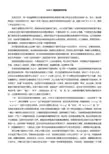
Unit 5 我是怎样识字的在我记忆中,我一生最重要的日子是我的老师安妮·曼斯菲尔德·沙利文走进我生活的那一天。
至今,每当我想起这一天仍会惊叹不已:是这一天把(我过的)截然不同的两种生活连在一起,那是1887年3月3日,离我7岁生日还有三个月。
我那个重要的日子的午后,我呆呆地站在我家的门廊上,内心充满了期盼。
从我母亲给我的手势和屋子里众人来来往往的忙碌中我隐约猜到将有不同寻常的事发生,于是我来到门口,在台阶上等着。
午后的阳光透过覆盖着门廊的忍冬花簇照射到我仰起的脸庞上。
我的手指近乎下意识地抚弄着这些熟悉的叶片和花朵。
它们刚刚抽叶开花,迎来南方温馨的春天。
至于我的未来究竟会出现什么样的奇迹,我茫然不知。
几个星期来,愤怒和怨恨一直折磨着我。
这种激烈的情感争斗之后是一种极度的疲惫。
你可曾在航海时遇上过浓雾?那时,你仿佛被困在了触手可及的一片白茫茫中,不见天日。
你乘坐的巨轮,靠测深锤和测深线的指引,举步维艰地靠向海岸,既紧张又焦急不安;而你则心里怦怦直跳,等着什么事情发生。
我在接受教育之前正像那艘巨轮,所不同的是我连指南针或测深线都没有,更无从知晓离港湾还有多远。
我的心灵在无声地疾呼:“光明!给我光明吧!”而就在那个时刻,爱的光芒洒在了我的身上。
我感觉到有脚步由远及近,于是我伸出了手,以为会是母亲。
有人抓住了我的手,将我抱住并紧紧地搂在了怀里。
正是这个人的到来,把整个世界展示给我,最重要的是,给我带来了爱。
在老师来到我家的第二天上午,她把我带到了她的房间,给了我一个玩具娃娃。
这娃娃是帕金斯学校的小盲童们送给我的礼物,劳拉·布里奇曼给娃娃穿上了衣服,不过这些是我在后来才知道的。
我玩了一小会儿之后,沙利文小结慢慢地在我的手上拼出了“d-o-l-l”(玩偶)这个词。
我一下子便对这种手指游戏产生了兴趣,而且试着模仿它。
当我终于正确地拼出了这几个字母时,内心充满了孩子气的喜悦和自豪。

Writing Three Thank-You LettersAlex Haley1 It was 1943, duringWorld War II, and I was a young U. S. coastgu ardsma n. My ship, the USS Murzim, had been under way for several days. Most of her holds contain ed thousan ds of cartons of cannedor dried foods. The other holds were loadedwith five-hundred-pound bombs packeddelicat ely in paddedracks. Our destina tion was a big base on the islandof Tulagiin the South Pacific.写三封感谢信亚利克斯·黑利那是在二战期间的1943年,我是个年轻的美国海岸警卫队队员。
我们的船,美国军舰军市一号已出海多日。
多数船舱装着成千上万箱罐装或风干的食品。
其余的船舱装着不少五百磅重的炸弹,都小心翼翼地放在垫过的架子上。
我们的目的地是南太平洋图拉吉岛上一个规模很大的基地。
2 I was one of the Murzim's several cooks and, quite the same as for folk ashore,this Thanksg ivingmorning had seen us busilyprepari ng a traditi onal dinnerfeaturi ng roast turkey.我是军市一号上的一个厨师,跟岸上的人一样,那个感恩节的上午,我们忙着在准备一道以烤火鸡为主的传统菜肴。
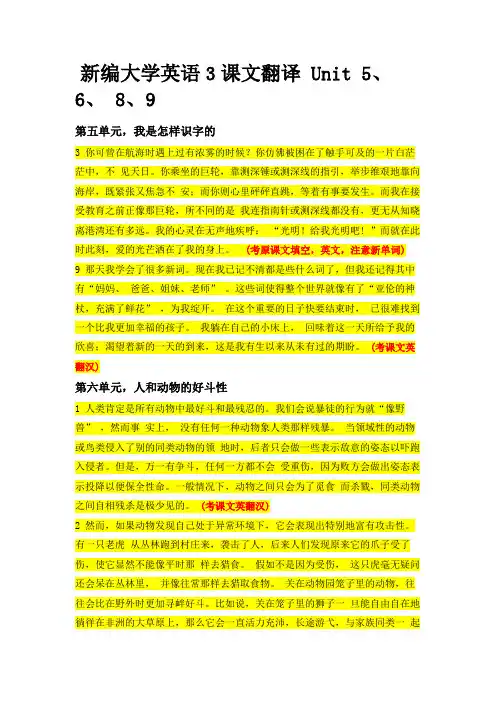
新编大学英语3课文翻译 Unit 5、6、 8、9第五单元,我是怎样识字的3 你可曾在航海时遇上过有浓雾的时候?你仿佛被困在了触手可及的一片白茫茫中,不见天日。
你乘坐的巨轮,靠测深锤或测深线的指引,举步维艰地靠向海岸,既紧张又焦急不安;而你则心里砰砰直跳,等着有事要发生。
而我在接受教育之前正像那巨轮,所不同的是我连指南针或测深线都没有,更无从知晓离港湾还有多远。
我的心灵在无声地疾呼:“光明!给我光明吧! ”而就在此时此刻,爱的光芒洒在了我的身上。
(考原课文填空,英文,注意新单词) 9 那天我学会了很多新词。
现在我已记不清都是些什么词了,但我还记得其中有“妈妈、爸爸、姐妹、老师”。
这些词使得整个世界就像有了“亚伦的神杖,充满了鲜花”,为我绽开。
在这个重要的日子快要结束时,已很难找到一个比我更加幸福的孩子。
我躺在自己的小床上,回味着这一天所给予我的欣喜;渴望着新的一天的到来,这是我有生以来从未有过的期盼。
(考课文英翻汉)第六单元,人和动物的好斗性1 人类肯定是所有动物中最好斗和最残忍的。
我们会说暴徒的行为就“像野兽”,然而事实上,没有任何一种动物象人类那样残暴。
当领域性的动物或鸟类侵入了别的同类动物的领地时,后者只会做一些表示敌意的姿态以吓跑入侵者。
但是,万一有争斗,任何一方都不会受重伤,因为败方会做出姿态表示投降以便保全性命。
一般情况下,动物之间只会为了觅食而杀戮,同类动物之间自相残杀是极少见的。
(考课文英翻汉)2 然而,如果动物发现自己处于异常环境下,它会表现出特别地富有攻击性。
有一只老虎从丛林跑到村庄来,袭击了人,后来人们发现原来它的爪子受了伤,使它显然不能像平时那样去猎食。
假如不是因为受伤,这只虎毫无疑问还会呆在丛林里,并像往常那样去猎取食物。
关在动物园笼子里的动物,往往会比在野外时更加寻衅好斗。
比如说,关在笼子里的狮子一旦能自由自在地徜徉在非洲的大草原上,那么它会一直活力充沛,长途游弋,与家族同类一起追捕食物。
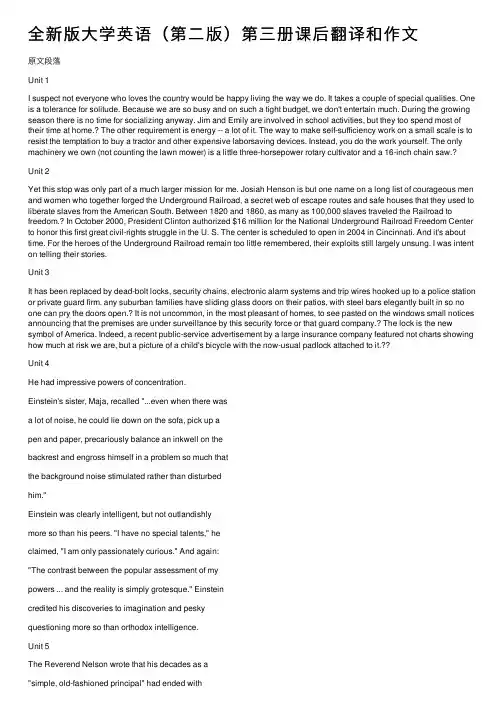
全新版⼤学英语(第⼆版)第三册课后翻译和作⽂原⽂段落Unit 1I suspect not everyone who loves the country would be happy living the way we do. It takes a couple of special qualities. One is a tolerance for solitude. Because we are so busy and on such a tight budget, we don't entertain much. During the growing season there is no time for socializing anyway. Jim and Emily are involved in school activities, but they too spend most of their time at home.? The other requirement is energy -- a lot of it. The way to make self-sufficiency work on a small scale is to resist the temptation to buy a tractor and other expensive laborsaving devices. Instead, you do the work yourself. The only machinery we own (not counting the lawn mower) is a little three-horsepower rotary cultivator and a 16-inch chain saw.? Unit 2Yet this stop was only part of a much larger mission for me. Josiah Henson is but one name on a long list of courageous men and women who together forged the Underground Railroad, a secret web of escape routes and safe houses that they used to liberate slaves from the American South. Between 1820 and 1860, as many as 100,000 slaves traveled the Railroad to freedom.? In October 2000, President Clinton authorized $16 million for the National Underground Railroad Freedom Center to honor this first great civil-rights struggle in the U. S. The center is scheduled to open in 2004 in Cincinnati. And it's about time. For the heroes of the Underground Railroad remain too little remembered, their exploits still largely unsung. I was intent on telling their stories.Unit 3It has been replaced by dead-bolt locks, security chains, electronic alarm systems and trip wires hooked up to a police station or private guard firm. any suburban families have sliding glass doors on their patios, with steel bars elegantly built in so no one can pry the doors open.? It is not uncommon, in the most pleasant of homes, to see pasted on the windows small notices announcing that the premises are under surveillance by this security force or that guard company.? The lock is the new symbol of America. Indeed, a recent public-service advertisement by a large insurance company featured not charts showing how much at risk we are, but a picture of a child's bicycle with the now-usual padlock attached to it.??Unit 4He had impressive powers of concentration.Einstein's sister, Maja, recalled "...even when there wasa lot of noise, he could lie down on the sofa, pick up apen and paper, precariously balance an inkwell on thebackrest and engross himself in a problem so much thatthe background noise stimulated rather than disturbedhim."Einstein was clearly intelligent, but not outlandishlymore so than his peers. "I have no special talents," heclaimed, "I am only passionately curious." And again:"The contrast between the popular assessment of mypowers ... and the reality is simply grotesque." Einsteincredited his discoveries to imagination and peskyquestioning more so than orthodox intelligence.Unit 5The Reverend Nelson wrote that his decades as a"simple, old-fashioned principal" had ended withschools undergoing such swift changes that he had retired in self-doubt. "I heard more of what I had done wrong than what I did right," he said, adding that my letter had brought him welcome reassurance that his career had been appreciated.? A glance at Grandma's familiar handwriting brought back in a flash memories of standing alongside her white rocking chair, watching her "settin' down" some letter to relatives. Character by character, Grandma would slowly accomplish one word, then the next, so that a finished page would consume hours. I wept over the page representing my Grandma's recent hours invested in expressing her loving gratefulness to me -- whom she used to diaper!?Unit 6Old Behrman was a painter who lived on the ground floor beneath them. He was past sixty and had a long, white beard curling down over his chest. Despite looking the part, Behrman was a failure in art. For forty years he had been always about to paint a masterpiece, but had never yet begun it. He earned a little by serving as a model to those young artists who could not pay the price of a professional. He drank gin to excess, and still talked of his coming masterpiece. For the rest he was a fierce little old man, who mocked terribly at softness in any one, and who regarded himself as guard dag to the two young artists in the studio above.? Sue found Behrman smelling strongly of gin in his dimly lighted studio below. In one corner was a blank canvas on an easel that had been waiting there for twenty-five years to receive the first line of the masterpiece. She told him of Johnsy’s fancy, and how she feared she would, indeed, light and fragile as a leaf herself, when her slight hold upon the world grew weaker.Old Behrman, with his red eyes, plainly streaming, shouted his contempt for such foolish imaginings.Unit 7His mind was trapped in a body that didn't work. Speaking was difficult and took time. People were impatient and didn't listen. He felt different -- was different -- from the kids who rushed about in the halls and planned dances he would never attend.? What could his future be? Porter wanted to do something and his mother was certain that he could rise above his limitations. With her encouragement, he applied for a job with the Fuller Brush Co. only to be turned down. He couldn't carry a product briefcase or walk a route, they said.? Porter knew he wanted to be a salesman. He began reading help wanted ads in the newspaper. When he saw one for Watkins, a company that sold household products door-to-door, his mother set up a meeting with a representative. The man said no, but Porter wouldn't listen. He just wanted a chance. The man gave in and offered Porter a section of the city that no salesman wanted.?句⼦翻译1.We have a problem with the computer system, but I think it is fairly minor.我们的计算机系统出了⽑病,但我觉得问题⽐较⼩。
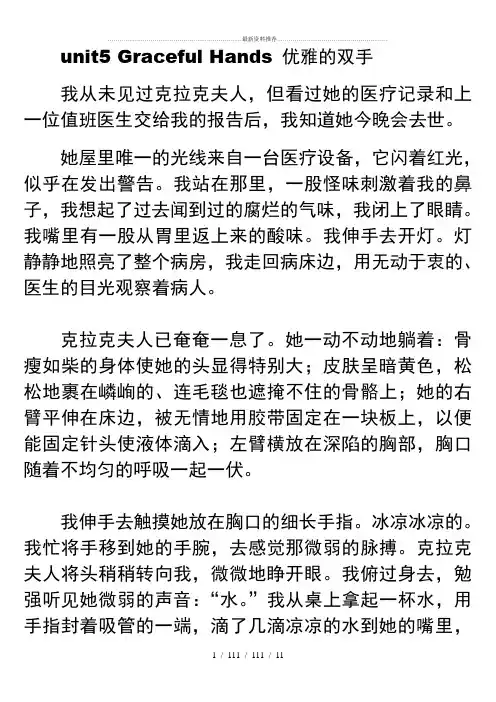
unit5 Graceful Hands 优雅的双手我从未见过克拉克夫人,但看过她的医疗记录和上一位值班医生交给我的报告后,我知道她今晚会去世。
她屋里唯一的光线来自一台医疗设备,它闪着红光,似乎在发出警告。
我站在那里,一股怪味刺激着我的鼻子,我想起了过去闻到过的腐烂的气味,我闭上了眼睛。
我嘴里有一股从胃里返上来的酸味。
我伸手去开灯。
灯静静地照亮了整个病房,我走回病床边,用无动于衷的、医生的目光观察着病人。
克拉克夫人已奄奄一息了。
她一动不动地躺着:骨瘦如柴的身体使她的头显得特别大;皮肤呈暗黄色,松松地裹在嶙峋的、连毛毯也遮掩不住的骨骼上;她的右臂平伸在床边,被无情地用胶带固定在一块板上,以便能固定针头使液体滴入;左臂横放在深陷的胸部,胸口随着不均匀的呼吸一起一伏。
我伸手去触摸她放在胸口的细长手指。
冰凉冰凉的。
我忙将手移到她的手腕,去感觉那微弱的脉搏。
克拉克夫人将头稍稍转向我,微微地睁开眼。
我俯过身去,勉强听见她微弱的声音:“水。
”我从桌上拿起一杯水,用手指封着吸管的一端,滴了几滴凉凉的水到她的嘴里,以缓解她的干渴。
她没有用力去吞咽,因为力气不够。
“还要,”那干涩的声音说。
于是我们又重复了一次。
这次她终于咽了一些,并轻轻说了声:“谢谢,你。
”她虚弱得没法交谈,因此没等她要求,我就开始做她所需要的。
我像抱孩子似的把她抱起来,给她翻了个身。
除了一件浅色的病号服,她什么也没穿。
她又小又轻,像遭受了严重饥荒一样。
我打开护肤霜的瓶盖,揩了一些在手心。
为了不伤着她,我小心翼翼地把护肤霜擦在她发黄的皮肤上。
她的皮肤松松地在骨头上滑动,背上每块骨头的轮廓都能清楚地摸到。
当我把枕头放在她两腿之间时,发现它们也是冰凉的,直到把手移到她膝盖以上的部位,我才感受到血液供给生命的热度。
而后,我挪了把椅子面朝她坐在床边,握住她那只没被固定的手,此时我又一次注意到她细长的手指。
很优雅。
一时间,我突然想知道她是否有家庭,接着我发现病房里没有花,没有孩子们画的彩虹和蝴蝶,也没有卡片。
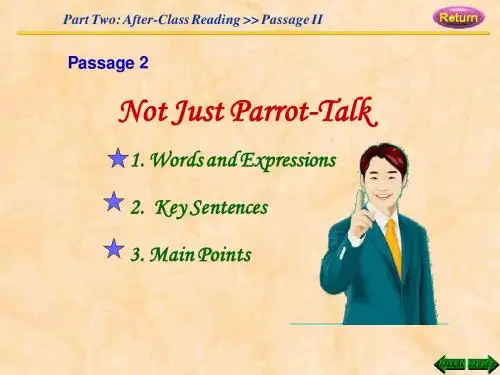
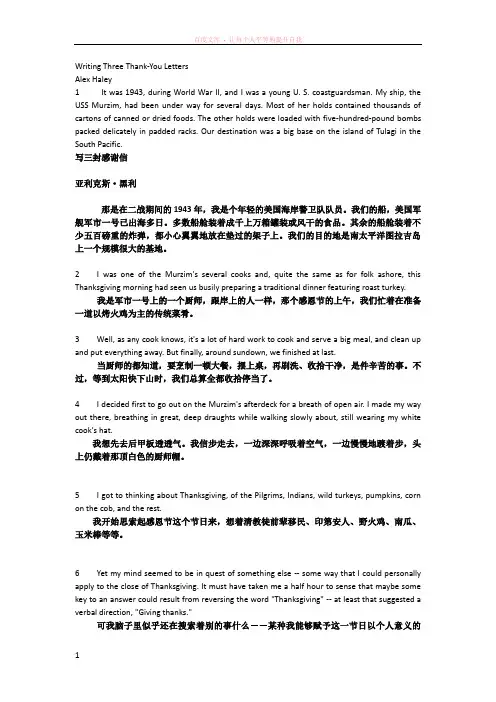
Writing Three Thank-You LettersAlex Haley1 It was 1943, during World War II, and I was a young U. S. coastguardsman. My ship, the USS Murzim, had been under way for several days. Most of her holds contained thousands of cartons of canned or dried foods. The other holds were loaded with five-hundred-pound bombs packed delicately in padded racks. Our destination was a big base on the island of Tulagi in the South Pacific.写三封感谢信亚利克斯·黑利那是在二战期间的1943年,我是个年轻的美国海岸警卫队队员。
我们的船,美国军舰军市一号已出海多日。
多数船舱装着成千上万箱罐装或风干的食品。
其余的船舱装着不少五百磅重的炸弹,都小心翼翼地放在垫过的架子上。
我们的目的地是南太平洋图拉吉岛上一个规模很大的基地。
2 I was one of the Murzim's several cooks and, quite the same as for folk ashore, this Thanksgiving morning had seen us busily preparing a traditional dinner featuring roast turkey.我是军市一号上的一个厨师,跟岸上的人一样,那个感恩节的上午,我们忙着在准备一道以烤火鸡为主的传统菜肴。
3 Well, as any cook knows, it's a lot of hard work to cook and serve a big meal, and clean up and put everything away. But finally, around sundown, we finished at last.当厨师的都知道,要烹制一顿大餐,摆上桌,再刷洗、收拾干净,是件辛苦的事。
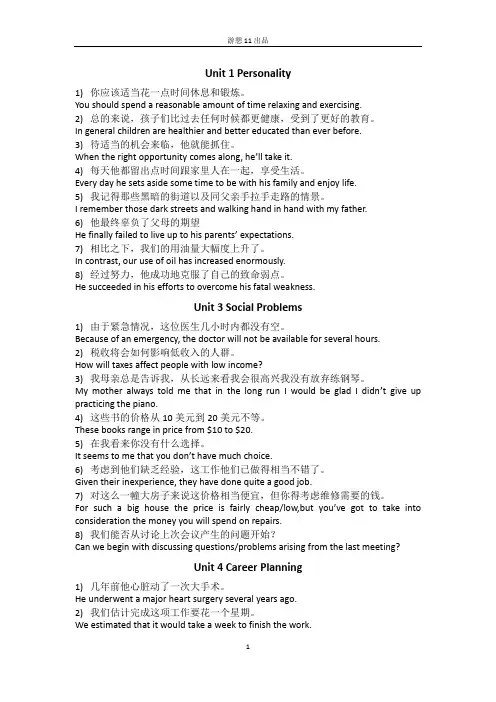
Unit 1 Personality1)你应该适当花一点时间休息和锻炼。
You should spend a reasonable amount of time relaxing and exercising.2)总的来说,孩子们比过去任何时候都更健康,受到了更好的教育。
In general children are healthier and better educated than ever before.3)待适当的机会来临,他就能抓住。
When the right opportunity comes along, he’ll take it.4)每天他都留出点时间跟家里人在一起,享受生活。
Every day he sets aside some time to be with his family and enjoy life.5)我记得那些黑暗的街道以及同父亲手拉手走路的情景。
I remember those dark streets and walking hand in hand with my father.6)他最终辜负了父母的期望He finally failed to live up to his parents’ expectations.7)相比之下,我们的用油量大幅度上升了。
In contrast, our use of oil has increased enormously.8)经过努力,他成功地克服了自己的致命弱点。
He succeeded in his efforts to overcome his fatal weakness.Unit 3 Social Problems1)由于紧急情况,这位医生几小时内都没有空。
Because of an emergency, the doctor will not be available for several hours.2)税收将会如何影响低收入的人群。

全新版大学英语(第二版)综合教程3课文翻译Chinese Translations of Texts A (Units 1-8)Text A课文目录第一单元多尔蒂先生创建自己的理想生活第二单元给人以自由者第三单元锁之国第四单元爱因斯坦一个外星人吗?第五单元写三封感谢信第六单元最后一片叶子第七单元一个推销员的生活第八单元克隆生命诞生了参考译文第一单元生活方式的改变课文 A在美国,不少人对乡村生活怀有浪漫的情感。
许多居住在城镇的人梦想着自己办个农场,梦想着靠土地为生。
很少有人真去把梦想变为现实。
或许这也没有什么不好,因为,正如吉姆·多尔蒂当初开始其写作和农场经营双重生涯时所体验到的那样,农耕生活远非轻松自在。
但他写道,自己并不后悔,对自己做出的改变生活方式的决定仍热情不减。
多尔蒂先生创建自己的理想生活售姆·多尔蒂有两件事是我一直想做的——写作与务农。
如今我同时做着这两件事。
作为作家,我和E· B·怀特不属同一等级,作为农场主,我和乡邻也不是同一类人,不过我应付得还行。
在城市以及郊区历经多年的怅惘失望之后,我和妻子桑迪终于在这里的乡村寻觅到心灵的满足。
这是一种自力更生的生活。
我们食用的果蔬几乎都是自己种的。
自家饲养的鸡提供鸡蛋,每星期还能剩余几十个出售。
自家养殖的蜜蜂提供蜂蜜,我们还自己动手砍柴,足可供过冬取暖之用。
这也是一种令人满足的生活。
夏日里我们在河上荡舟,在林子里野餐,骑着自行车长时间漫游。
冬日里我们滑雪溜冰。
我们为落日的余辉而激动。
我们爱闻大地回暖的气息,爱听牛群哞叫。
我们守着看鹰儿飞过上空,看玉米田间鹿群嬉跃。
但如此美妙的生活有时会变得相当艰苦。
就在三个月前,气温降到华氏零下30度,我们辛苦劳作了整整两天,用一个雪橇沿着河边拖运木柴。
再过三个月,气温会升到95度,我们就要给玉米松土,在草莓地除草,还要宰杀家禽。
前一阵子我和桑迪不得不翻修后屋顶。
过些时候,四个孩子中的两个小的,16岁的吉米和 13岁的埃米莉,会帮着我一起把拖了很久没修的室外厕所修葺一下,那是专为室外干活修建的。
Unit 5 LanguageHow I Discovered WordsHelen KellerThe most important day I remember in all my life is the one on which my teacher, Anne Mansfield Sullivan, came to me. I am filled with wonder when I consider the immeasurable contrast between the two lives which it connects. It was the third of March, 1887, three months before I was seven years old.On the afternoon of that eventful day, I stood on the porch, dumb, expectant. I guessed vaguely from my mother's signs and from the hurrying to and fro in the house that something unusual was about to happen, so I went to the door and waited on the steps. The afternoon sun penetrated the mass of honeysuckle that covered the porch, and fell on my upturned face. My fingers lingered almost unconsciously on the familiar leaves and blossoms which had just come forth to greet the sweet southern spring. I did not know what the future held of marvel or surprise for me. Anger and bitterness had preyed upon me continually for weeks and a deep languor had succeeded this passionate struggle.Have you ever been at sea in a dense fog, when it seemed as if a tangible white darkness shut you in, and the great ship, tense and anxious, groped her way toward the shore with plummet and sounding-line, and you waited with beating heart for something to happen? I was like that ship before my education began, only I was without compass or sounding-line, and had no way of knowing how near the harbor was. "Light! Give me light!" was the wordless cry of my soul, and the light of love shone on me in that very hour.I felt approaching footsteps. I stretched out my hand as I supposed to my mother. Someone took it, and I was caught up and held close in the arms of her who had come to reveal all things to me, and, more than all things else, to love me.The morning after my teacher came she led me into her room and gave me a doll. The little blind children at the Perkins Institution had sent it and Laura Bridgman had dressed it; but I did not know this until afterward. When I had played with it a little while, Miss Sullivan slowly spelled into my hand the word "d-o-l-l". I was at once interested in this finger play and tried to imitate it. When I finally succeeded in making the letters correctly I was flushed with childish pleasure and pride. Running downstairs to my mother I held up my hand and made the letters for doll. I did not know that I was spellinga word or even that words existed; I was simply making my fingers go in monkey-like imitation. In the days that followed I learned to spell in this uncomprehending way a great many words, among them, pin, hat, cup and a few verbs like sit, stand and walk. But my teacher had been with me several weeks before I understood that everything has a name.One day, while I was playing with my new doll, Miss Sullivan put my big rag doll into my lap, also spelled "d-o-l-l" and tried to make me understand that "d-o-l-l" applied to both. Earlier in the day we had had a tussle over the words "m-u-g" and "w-a-t-e-r". Miss Sullivan had tried to impress it upon me that "m-u-g" is mug and that "w-a-t-e-r" is water, but I persisted in confounding the two. In despair she had dropped the subject for the time, only to renew it at the first opportunity. I became impatient at her repeated attempts and, seizing the new doll, I dashed it upon the floor. I was keenly delighted when I felt the fragments of the broken doll at my feet. Neither sorrow nor regret followed my passionate outburst. I had not loved the doll. In the still, dark world in which I lived there was no strong sentiment or tenderness. I felt my teacher sweep the fragments to one side of the hearth, and I had a sense of satisfaction that the cause of my discomfort was removed. She brought me my hat, and I knew I was going out into the warm sunshine. This thought, if a wordless sensation may be called a thought, made me hop and skip with pleasure.We walked down the path to the well-house, attracted by the fragrance of the honeysuckle with which it was covered. Someone was drawing water and my teacher placed my hand under the spout. As the cool stream gushed over one hand she spelled into the other the word water, first slowly, then rapidly. I stood still, my whole attention fixed upon the motions of her fingers. Suddenly, I felt a misty consciousness as of something forgotten-a thrill of returning thought; and somehow the mystery of language was revealed to me. I knew then that "w-a-t-e-r" meant the wonderful cool something that was flowing over my hand. That living word awakened my soul, gave it light, hope, joy, set it free! There were barriers still, it is true, but barriers that could in time be swept away.I left the well-house eager to learn. Everything had a name, and each name gave birth to a new thought. As we returned to the house every object which I touched seemed to quiver with life. That was because I saw everything with the strange, new sight that had come to me. On entering the door I remembered the doll I had broken. I felt my way to the hearth and picked up the pieces. I tried vainly to put them together. Then my eyesfilled with tears; for I realized what I had done, and for the first time I felt repentance and sorrow.I learned a great many new words that day. I do not remember what they all were; but I do know that mother, father, sister, teacher were among them-words that were to make the world blossom for me, "like Aaron's rod, with flowers". It would have been difficult to find a happier child than I was as I lay in my crib at the close of that eventful day and lived over the joys it had brought me, and for the first time longed for a new day to come.我是怎样识字的在我记忆中,我一生最重要的日子是我的老师安妮·曼斯菲尔德·沙利文走进我生活的那一天。
新编大学英语2第三册课文翻译Unit 1 羞怯的痛苦对许多人来说,羞怯是很多不愉快的起因。
各种各样的人——矮的、高的、愚笨的、聪明的、年轻的、年老的、瘦的、胖的——都说自己是羞怯的。
羞怯的人会焦虑不安,感到不自然;也就是说,他们过分地关注自己的外表和举止。
脑海中不断盘旋着一些使自己不安的想法:我给人留下的是什么印象?他们喜欢我吗?我讲话是不是傻里傻气?我长得难看。
我穿的衣服毫不引人注目。
很显然这种不安的感觉会对人产生不利的影响。
一个人的自我看法反映在自己的行为方式之中,而一个人的行为方式又影响他人的反应。
通常,人们如何看待自己对他们生活的各个方面都会产生深刻的影响。
例如,具有积极的自我价值观或很强自尊心的人往往表现出自信。
而由于自信,他们不需要他人不断地称赞和鼓励,也能使自己感觉良好。
自信者热情、自发地投入生活。
他们不因别人认为他们“该”做什么而受到影响。
有很强自尊心的人不会被批评所伤害;他们不会把批评看作是人身攻击。
相反,他们认为批评是一种提醒他们改进的建议。
相比之下,羞怯的人自尊心较弱,往往消极被动并且容易受他人影响。
他们(是否)在做“该做的事情”需要得到别人的肯定。
害羞的人对批评非常敏感;他们觉得批评正好证实了他们比别人差。
他们也很难因别人的赞美而高兴,因为他们相信自己不值得称赞。
羞怯的人也许会用这样的话来回答别人的赞美之辞:“你这么说只是为了让我感觉好一些。
我知道这不是真的。
”显然,尽管自我意识是一种健康的品质,过分的自我意识却是不利和有害的。
能否彻底消除或者至少减轻羞怯感呢?幸运的是,人们能够通过坚持不懈的努力建立自信从而克服羞怯。
由于胆怯和缺少自尊是密切相关的,因此正视自己的弱点和正视自己的优点一样重要。
例如,大多数人希望每门功课都得A。
如果仅仅因为在某些领域有困难,就把自己列为差生,这不恰如其分。
人们对自己的期望必须现实。
老是想那些不可能的事情会令自己觉得无能,甚至产生嫉妒。
当我们嫉妒比自己成绩好的学生时,我们正在自我否定。
Unit 5 DreamsAre You a Dreamer?1 Dreams—why do we have them? Do they mean anything? Is there such a thing asa dream in which the events seen by the dreamer come true? Such questions have interested people for thousands of years. Scientific advances in the past few decades have revealed more about the physical process of sleep, but they still don't offer any final answers to the many questions about dreams that continue to puzzle us.2 Everyone dreams—it's just that some of us can't remember doing so. Recordings of human brain waves show that we all go into dream mode when we fall asleep. We dream for most of the night, but we're only able to remember our dreams if we happen to wake up while we are still in REM (Rapid Eye Movement) sleep. This is when we dream. We have four or five REM stages of sleep during the night, the first occurring about 90 minutes after we fall asleep. After that, our dreaming periods recur every 90 minutes and last between 15 to 45 minutes, getting longer as the night progresses.3 The main purpose of sleeping (apart from giving us rest) may be to allow us to dream—to review our lives, our worries and hopes in a totally different way, and to get an unconscious view of ourselves, getting rid of material from our memories that we no longer need.4 Some dreams may have a simple physiological cause. Dreaming of walking on hot coals, for example, may well be caused by sleeping with your feet too close to a heater. And the frustrating dream in which you try to run but your legs won't move may be explained by bedding that is too tight. Anyone who sleeps through their alarm may well dream of doorbells or telephones ringing. All are simple examples of how the unconscious works with our conscious mind to guide and advise us.5 But such physiological explanations are not enough to tell us why we dream. Some people believe that dreams are total nonsense, merely the result of the misfiring of electrical impulses in the brain, while on the other hand, some read great importance into even the simplest of dreams.6 Some dreams reflect inner fears that are instantly recognizable. Dreaming of losing your job or house can reflect real fears, even if they are only subconscious. Most of us have dreamed that we had to take a final exam for a difficult course, which we had never taken, or in which we had done poorly.7 But what of the dreams that do not have such an obvious meaning? For centuries, both men and women have sought the answers in so-called dream dictionaries, possibly the oldest of which dates back to 5000 BC. According to these dictionaries, a dreamabout drinking wine meant a short life, whereas a dream about drinking water predicted a long life.8 By AD 200, dream dictionaries had lost none of their popularity, and the ancient Greek Artemidorus wrote a five-volume interpretation of more than 3,000 dreams, listing such symbols as right hand (meaning father), left hand (meaning mother), and dolphin (a good omen).9 Today, there are countless books offering dream interpretations in libraries and bookshops. They're as popular as ever with dream enthusiasts, but most experts warn that they should be read with care. Psychoanalyst and author Kenneth Saunders explains, "Dreams are closely tied up with an individual's mind and analysis is so open to mistakes or errors. I believe you can only discover the true meaning of a dream if you know the person who had the dream."你做梦吗?1 梦,我们为什么会做梦?梦有意义吗?真的有梦中所见的事成为现实这种事吗?几千年来这些问题一直让人们感兴趣。
大学英语精读第3册第5课课文翻译及课后答案课文翻译妈妈哭的那天很久前一个阴暗的冬天,我放学回家,心中充满着期待。
我腋下夹着一本我所喜爱的刚出版的体育杂志,而且整个房子将只有我一个人。
爸爸还没下班,妹妹不在家,妈妈刚找到一份新工作,在一小时内是不会回家的,我跳上台阶,冲进起居室,啪的一声打开电灯。
我眼前出现的景象使我惊呆了。
妈妈紧缩着身子。
手捂着脸,坐在沙发的一端,她在哭。
我以前从没见她哭过。
我小心地走近她,把手放在她肩上。
“妈”我说,“怎么了?”妈妈长叹一口气,强作微笑。
“没什么,真的。
没什么大不了的事。
只是我要失去这份新工作了。
我字打的不够快。
”“但你才上三天班,”我说,“你会赶上的。
”我重复了妈妈对我说过的一百遍的那句话。
每当我学什么或做什么重要事情而遇到麻烦时,妈常这样对我说。
“不行了,”妈妈神色黯淡地对我说。
“过去我常说只要我下决心,什么事我都能干好。
现在我仍然认为在多数情况下我能做到。
但是,打字这事我做不到啦。
”我无能为力,十分尴尬。
那时我16岁,仍然认为妈妈能做任何事。
几年前,当我们卖掉农场,搬到城里来住的时候,妈妈决定开一所日托所。
她没受过这方面的训练,但这并不妨碍她。
她参加幼托函授课学习,做练习,六个月后就正式获得从事这项工作的资格了。
不久后,她不但招满了生,而且还有许多孩子等着注册。
我认为这是理所当然的,是妈妈能力的体现。
但是不管是日托所还是后来爸妈买的汽车旅馆都无法提供足够的钱送我和妹妹上大学。
两年后我就要准备上大学了。
再过三年,妹妹也想上大学。
时间过得真快。
妈妈想尽了一切方法存钱。
很明显,爸爸不可能比他现在干得更多---除了一份全日制工作外,还要耕种80英亩地。
在我们卖掉汽车旅馆几个月后,妈弄回家一台旧式打字机。
这台打字机跳字,键盘也很松。
那天吃饭时,我说这台打字是“废物一件”。
“我们只买得起这个,”妈妈说。
“这对练打字是够好的了。
”从那天开始,只要桌子一收拾,碗一洗,妈妈就会消失到她的缝纫房里练习打字。
原文段落Unit 1I suspect not everyone who loves the country would be happy living the way we do. It takes a couple of special qualities. One is a tolerance for solitude. Because we are so busy and on such a tight budget, we don't entertain much. During the growing season there is no time for socializing anyway. Jim and Emily are involved in school activities, but they too spend most of their time at home.? The other requirement is energy -- a lot of it. The way to make self-sufficiency work on a small scale is to resist the temptation to buy a tractor and other expensive laborsaving devices. Instead, you do the work yourself. The only machinery we own (not counting the lawn mower) is a little three-horsepower rotary cultivator and a 16-inch chain saw.?Unit 2Yet this stop was only part of a much larger mission for me. Josiah Henson is but one name on a long list of courageous men and women who together forged the Underground Railroad, a secret web of escape routes and safe houses that they used to liberate slaves from the American South. Between 1820 and 1860, as many as 100,000 slaves traveled the Railroad to freedom.? In October 2000, President Clinton authorized $16 million for the National Underground Railroad Freedom Center to honor this first great civil-rights struggle in the U. S. The center is scheduled to open in 2004 in Cincinnati. And it's about time. For the heroes of the Underground Railroad remain too little remembered, their exploits still largely unsung. I was intent on telling their stories.Unit 3It has been replaced by dead-bolt locks, security chains, electronic alarm systems and trip wires hooked up to a police station or private guard firm. any suburban families have sliding glass doors on their patios, with steel bars elegantly built in so no one can pry the doors open.? It is not uncommon, in the most pleasant of homes, to see pasted on the windows small notices announcing that the premises are under surveillance by this security force or that guard company.? The lock is the new symbol of America. Indeed, a recent public-service advertisement by a large insurance company featured not charts showing how much at risk we are, but a picture of a child's bicycle with the now-usual padlock attached to it.??Unit 4He had impressive powers of concentration.Einstein's sister, Maja, recalled "...even when there wasa lot of noise, he could lie down on the sofa, pick up apen and paper, precariously balance an inkwell on thebackrest and engross himself in a problem so much thatthe background noise stimulated rather than disturbedhim."Einstein was clearly intelligent, but not outlandishlymore so than his peers. "I have no special talents," heclaimed, "I am only passionately curious." And again:"The contrast between the popular assessment of mypowers ... and the reality is simply grotesque." Einsteincredited his discoveries to imagination and peskyquestioning more so than orthodox intelligence.Unit 5The Reverend Nelson wrote that his decades as a"simple, old-fashioned principal" had ended withschools undergoing such swift changes that he hadretired in self-doubt. "I heard more of what I had donewrong than what I did right," he said, adding that myletter had brought him welcome reassurance that hiscareer had been appreciated.? A glance at Grandma'sfamiliar handwriting brought back in a flash memoriesof standing alongside her white rocking chair, watchingher "settin' down" some letter to relatives. Character bycharacter, Grandma would slowly accomplish one word,then the next, so that a finished page would consumehours. I wept over the page representing my Grandma'srecent hours invested in expressing her lovinggratefulness to me -- whom she used to diaper!?Unit 6Old Behrman was a painter who lived on the groundfloor beneath them. He was past sixty and had a long,white beard curling down over his chest. Despitelooking the part, Behrman was a failure in art. For fortyyears he had been always about to paint a masterpiece,but had never yet begun it. He earned a little by servingas a model to those young artists who could not pay theprice of a professional. He drank gin to excess, and stilltalked of his coming masterpiece. For the rest he was afierce little old man, who mocked terribly at softness inany one, and who regarded himself as guard dag to thetwo young artists in the studio above.? Sue foundBehrman smelling strongly of gin in his dimly lightedstudio below. In one corner was a blank canvas on aneasel that had been waiting there for twenty-five yearsto receive the first line of the masterpiece. She told himof Johnsy’s fancy, and how she feared she would,indeed, light and fragile as a leaf herself, when herslight hold upon the world grew weaker.Old Behrman,with his red eyes, plainly streaming, shouted hiscontempt for such foolish imaginings.Unit 7His mind was trapped in a body that didn't work.Speaking was difficult and took time. People wereimpatient and didn't listen. He felt different -- wasdifferent -- from the kids who rushed about in the hallsand planned dances he would never attend.? Whatcould his future be? Porter wanted to do something andhis mother was certain that he could rise above hislimitations. With her encouragement, he applied for ajob with the Fuller Brush Co. only to be turned down.He couldn't carry a product briefcase or walk a route,they said.? Porter knew he wanted to be a salesman.He began reading help wanted ads in the newspaper.When he saw one for Watkins, a company that soldhousehold products door-to-door, his mother set up ameeting with a representative. The man said no, butPorter wouldn't listen. He just wanted a chance. Theman gave in and offered Porter a section of the city thatno salesman wanted.?句子翻译1.We have a problem with the computer system, but Ithink it is fairly minor.我们的计算机系统出了毛病,但我觉得问题比较小。
Book 3 Unit 1善良之心,久久相依当时我没有意识到,是爸爸帮我保持平衡奥古斯塔斯• J •布洛克1 随着我渐渐长大,当别人看见我和爸爸在一起,我会觉得很尴尬。
他身材矮小,走起路来跛得很厉害。
我们一起走时,他要把手搭在我的肩上才能保持平衡,人们就会盯着我们看。
对这种不必要的注意我觉得非常难堪。
他也许曾注意到,或着觉得烦恼,但他从来没有流露出来。
2 要协调我们的步伐并不容易,他(的步子)一瘸一拐的,我(走起来)则缺乏耐心。
因此,我们走路的时候并不怎么说话。
但出发时,他总是说:“你定步伐,我会尽量跟上。
”3 我们通常在家和地铁之间来往,这是他上班的必由之路。
不管生病还是碰到恶劣的天气他都去上班,几乎没有旷过一天工。
即使别人无法上班,他也要去办公室。
对他来说这是一种自豪。
4 当地上有冰或雪的时候,即使有人帮助他也无法走路。
这时,我或者我的姐妹就用孩子玩的雪撬拉着他,穿过纽约布鲁克林的街道,直到地铁的入口处。
一到那儿,他就能紧紧抓住扶手一直走下去, 地铁道里比较暖和,下面的楼梯不结冰。
曼哈顿的地铁站正好是他办公楼的地下室,因此除了从布鲁克林我们去接他的地方到回家为止,他都不用再出去。
5 一个成年男子要有多少勇气才能承受这种屈辱和压力,我现在想来惊讶不已。
他从没有痛苦或抱怨,他是怎么做到这一步的我感到不可思议。
6 他从不把自己当作同情的对象,也从不对更幸运的或更能干的人表示任何嫉妒。
他在别人身上所寻找的是一颗“善心”。
如果他找到了一颗善心,那么有这么颗心的人对他来说就是一位大好人了。
7 由于年龄的增长,我相信那是一种用来判断人的恰当的标准,尽管我还不能精确地知道什么是一颗“善心”。
但是,当我自己没有的时候,我是知道的。
8 尽管很多活动我爸爸不能参加,但他还是尽量用某种方式参与。
当本地的一支棒球队发现缺经理的时候,他使它维持下去。
他是一个很懂行的棒球迷,经常带我去埃贝茨球场看布鲁克林的道奇队打球。
他喜欢参加舞会和聚会,就是坐在一旁观看,也很开心。
新编大学英语第二版第三册第五单元课文翻译我是怎样识字的在我记忆中,我一生最重要的日子是我的老师安妮·曼斯菲尔德·沙利文走进我生活的那一天。
至今,每当我想起这一天仍会惊叹不已:是这一天把(我过的)截然不同的两种生活连在一起,那是1887年3月3日,离我7岁生日还有三个月。
我那个重要的日子的午后,我呆呆地站在我家的门廊上,内心充满了期盼。
从我母亲给我的手势和屋子里众人来来往往的忙碌中我隐约猜到将有不同寻常的事发生,于是我来到门口,在台阶上等着。
午后的阳光透过覆盖着门廊的忍冬花簇照射到我仰起的脸庞上。
我的手指近乎下意识地抚弄着这些熟悉的叶片和花朵。
它们刚刚抽叶开花,迎来南方温馨的春天。
至于我的未来究竟会出现什么样的奇迹,我茫然不知。
几个星期来,愤怒和怨恨一直折磨着我。
这种激烈的情感争斗之后是一种极度的疲惫。
你可曾在航海时遇上过浓雾?那时,你仿佛被困在了触手可及的一片白茫茫中,不见天日。
你乘坐的巨轮,靠测深锤和测深线的指引,举步维艰地靠向海岸,既紧张又焦急不安;而你则心里怦怦直跳,等着什么事情发生。
我在接受教育之前正像那艘巨轮,所不同的是我连指南针或测深线都没有,更无从知晓离港湾还有多远。
我的心灵在无声地疾呼:“光明!给我光明吧!”而就在那个时刻,爱的光芒洒在了我的身上。
我感觉到有脚步由远及近,于是我伸出了手,以为会是母亲。
有人抓住了我的手,将我抱住并紧紧地搂在了怀里。
正是这个人的到来,把整个世界展示给我,最重要的是,给我带来了爱。
在老师来到我家的第二天上午,她把我带到了她的房间,给了我一个玩具娃娃。
这娃娃是帕金斯学校的小盲童们送给我的礼物,劳拉·布里奇曼给娃娃穿上了衣服,不过这些是我在后来才知道的。
我玩了一小会儿之后,沙利文小结慢慢地在我的手上拼出了“d-o-l-l”(玩偶)这个词。
我一下子便对这种手指游戏产生了兴趣,而且试着模仿它。
当我终于正确地拼出了这几个字母时,内心充满了孩子气的喜悦和自豪。
我跑到楼下找到母亲,伸手拼出了“玩偶”所含的字母。
当时我并不知道我是在拼一个单词,甚至还不知道有“单词”这么回事;我只是像猴子那样用手指进行模仿。
在接下来的几天里,我就这样,虽然并不知词识义,却学会了拼写好些单词。
这些单词中有“别针”、“帽子”、“杯子”,还有些动词,如“坐”、“站”和“走”。
但是等我懂得了每样东西都有名字时,已经是我和老师在一起好几个星期之后的事了。
一天,我正在玩我的新玩具娃娃,这时,沙利文小姐把我的大布娃娃放在我的膝上,又给我拼了一遍“d-o-l-l”,想让我懂得“d-o-l-l”这个单词适用于这两件东西。
就在当天早些时候,我曾和她因“m-u-g”和“w-a-t-e-r”这两个词发生过争执。
沙利文小姐想让我记住“m-u-g”是“大杯”,而“w-a-t-e-r”是“水”,但我却总是把这两个词的意思给弄混。
失望之余她暂时搁起这一话题,但一有机会她就马上旧事重提。
我却对她一遍又一遍的努力感到忍无可忍,于是就抓起新的玩具娃娃,狠狠地砸在了地板上。
当我感觉到脚边摔碎的玩具娃娃时,产生了一种强烈的快感。
在这种强烈的情感发泄之后,我没有一丝伤感或懊悔之情。
我从没有喜欢过那个玩具娃娃。
在我所生活的那个无声、黑暗的世界里是没有柔情或情感的。
我感觉到老师已把碎片扫到了壁炉炉床的一边,此时我有一种满足感,因为让我不快的东西已不复存在了。
她给我拿来了草帽,我知道我将要走出屋子,到温暖的阳光下。
一想到这(如果一种无法用言语表达的感觉也可以称为想法的话),我便高兴地又蹦又跳。
我们沿着小路来到了井房,井房上布满了忍冬,它的芳香深深地吸引了我们。
有人正在抽水,老师把我的一只手放到了喷水口下方。
凉爽的水流过我的一只手,这时她在我的另一只手上拼写了“水”这个词。
开始她拼得很慢,接着拼得很快。
我站在那儿一动不动,所有的注意力都集中在她手指的移动上。
刹那间,我朦胧地意识到了些什么,仿佛记起了被久久遗忘的什么东西——那是一种恢复思维的激动。
不知怎的,语言的奥秘一下子展现在我的面前。
这时我明白了,“w-a-t-e-r”指的就是从我手上流过的那美妙无比的凉爽的东西。
这活生生的字眼唤醒了我沉睡的灵魂,赋予了它光明、希望和喜悦,使它获得了自由!诚然,障碍依然存在,但那是一些假以时日终究会被消除的障碍。
我离开井房,心中充满了求知的欲望。
万物皆有名,而每个名字又引申出一种新的概念。
在我们回家的路上,我感到我触摸到的每件东西似乎都有生机。
那是因为我在用刚刚赋予我的新奇的眼光看待每样东西。
进门时我记起了那个被我摔破的娃娃。
我摸索着来到了路床边,捡起那些碎片,试着把他们拼接在一起,但却徒劳无益。
这时我的眼里满是泪水,因为我意识到了自己先前干了些什么,而且有生以来第一次感到了悔恨和难过。
那天我学会了很多新词。
现在我已记不清都是些什么词了,但我还记得其中有“妈妈、爸爸、姐妹、老师”。
这些词使得整个世界在我面前绽放,“有如亚伦的神杖,开满了鲜花”。
在这个重要的日子就要结束时,已很难找到一个比我更加幸福的孩子了。
我躺在自己的小床上,回味着这一天所给予我的欣喜,渴望着新的一天的到来。
这是我有生以来从未有过的期盼。
外国口音第一节对我来说,我的确倾向于以口音来判断我所遇到的人。
我并不是说自己是势利小人,只喜欢有上流社会口音的人;但是,跟一个新结识的人在一起,我从来都不会感到自在,只有在我能够根据他们说的话判断出他们是哪里人之后,感觉才会不同。
如果是个英国人,我还能判断出“啊,他是利物浦人”,或者“他可能上过公立学校”,我就会觉得更自在。
这样我就知道该和他谈些什么以及他能够告诉我些什么。
(如果)对方是外国人,也一样。
就个人而言,我喜欢外国人说话带点明显的口音,这样我就知道自己是在和法国人、加纳人、波兰人或别的什么国家的人交谈。
所有对我来说,外国人话大力气改掉自己的本族语口音,想方设法去说标准英语,似乎是毫无意义的。
如果对方很明显是法国人,我就知道没有必要(与他)谈论板球或开爱尔兰人的玩笑。
坦率地说,我觉得外国口音更吸引人。
我无法解释为什么,但如果说话人带有外国口音,那么即便是说最最普通的事,也会显得妙趣横生。
第二节尽管如此,(口音)得有个限度,要能让人听懂。
如果口音太重,你非得费劲地去弄明白对方想要说什么,就会妨碍谈话的进行,而且交谈也就无法连贯,(因为)你的设法把对方的声音整理成能够明白的话语。
我所指的并非是这么重的口音,而是那种让你马上明白对方是哪国人,但又不妨碍你听懂他的话的那种口音。
我认为大多数外国人都有这样的口音,真的。
老实说,只有极少数听觉特别灵敏、模仿能力极强的人才能说还算纯正的英国英语。
即使能够那样,他们的英语听起来也会很可笑,因为他们可能学会的是一种非常明显的地方口音,甚至是与自己的气质特点完全不相称的上流社会口音。
但是大多数学英语的外国人都非常热衷于去掉自己的外国口音,并且为此浪费了很多时间。
第三节换一个角度来看,我得理解他们,甚至钦佩他们。
因为我自己法语说得还可以,如果别人认为我是法国人,我就感到很开心,如果别人一听就知道我是英国人,我也会感到很泄气。
同样的,对我来说,带英国口音的法语实在是太难听了,而且当我听自己的同胞在糟蹋法语时,总是感到很不自在。
所以我想外国人听到自己的同胞说蹩脚英语时,也会有同感的。
然而,法国朋友告诉我,略带英国口音的发育丝毫不会令他们感到难受,相反,还相当动听呢。
我还听说佩特拉·克拉克之所以能在法国成为成功的歌手,部分原因是因为她的英国口音。
所以我想,最著名的说英语的法国人之一,就是那位叫莫里斯·谢瓦利埃的演员,他靠一口明显的法语口音成就了一番事业。
其实若他愿意,他也许可以不带那么重的口音。
我把他和我的一个显然很有语言天赋的法国朋友进行对比。
我的这个法国朋友和我一起在英国的时候,总被人误认为是受过良好教育的英国人。
因为他的说话方式,我的应该朋友便以为他对英国生活的某些方面非常了解,而这些只有在英国生活多年才会了解的。
因而夜里从酒吧回来以后,他经常得让我解释一些事情给他听。
我不知道他花了多少时间纠正口音,但或许他更应该花时间扩大词汇量和加强对英国的了解。
既然英语是这样一种国际性的语言,我认为我们应该接受更多的口音,而学习者更应该注重(语言)结构和词汇的学习而不是口音(的纯正)。
不只是鹦鹉学舌科学家们已经教鹦鹉学英语了。
那又怎么样呢?这次这只鹦鹉似乎不仅会说话,而且还明白这些话的意思。
亚历克斯是一只灰色的非洲鹦鹉,住在美国印第安纳州的普渡大学。
它掌握了大约四十个词,以此来辨认、索要、有时甚至是拒绝五十多种玩具。
他似乎能熟练地把词作为抽象的符号加以运用——换句话说,似乎会使用初级形态的语言。
很多鸟交流时采用简单、固定不变的符号。
有些鸟,例如鹦鹉,能通过相互模仿或者模仿其它鸟类而掌握大量的用语。
但是,将一个声音只与某个物体或特征联系起来,此前尚无证据表明任何鸟类能够实现这一大飞跃。
亚历克斯却可以。
它的训练员艾琳·佩柏伯格博士利用鹦鹉天生的好奇心教它使用不同玩具的名称。
训练员和一名助手边玩玩具,边就这些玩具相互提问。
鹦鹉要想加入进去一起玩的话,就必须赢得训练员的注意。
(训练)结果十分惊人。
亚历克斯很快就学会了运用表示形状、颜色和材料的词来确定要索取的东西(例如,三角的绿纸,或是五角的黄木头)。
训练员要求它反复说这些词,直到说对了为止,然后才把那件东西奖给它玩。
佩柏伯格博士认为不能奖给它是无。
这点很重要,因为那样会使它把词语当成是得到食物款待的手段,而不是表示物体的符号。
亚历克斯每周接受两次这样的测试,通常它能搞对80%的物体。
它犯的错往往是一些小疏漏(例如忘了说某样东西的颜色),而不是具体的错误。
为了了解它是否真正掌握了颜色和形状等概念,训练员给它展示了一些全新的组合。
当第一次看到一块蓝色的皮革时,它会说“蓝色兽皮”,尽管它以前看到的蓝色物体都是钥匙或木制品。
这表明它已意识到词汇就像积木一样,可以进行不同的搭配。
但是,仅学会一些形容词和名词离掌握一门语言还相差甚远。
科学家们一直都在寻找证据,证明亚历克斯懂得更复杂的概念。
一个令人意想不到的突破在它学会说“不”时实现了。
这个词是它从训练员以及助手之间的谈话中学会的,而且它似乎至少明白这个词的一个含义——拒绝(例如,当佩柏伯格博士想和它玩,而它不想玩时)。
如果问它眼前有几件东西时,它还能够数到5。
偶尔有线索表明,它掌握了更为高级的概念,但佩柏伯格博士对此却很谨慎。
公众对于黑猩猩能使用手势语的反应最近从兴奋转为批评,因而无人再敢做出过分的断言了。
这并不是说人们怀疑猿猴没有能力积累大量的手语词汇。
辩论的焦点在于猿猴是否能懂得句法。
证明猿猴能懂得句法的例子既少而且又有争议。